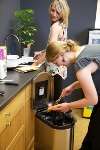Within the next decade, more than 20 percent of electrical demand in the United States is expected to be met by building operators and homeowners more effectively optimizing their energy consumption and resources in collaboration with their utilities, say energy experts at Honeywell.
A grocery store, greenhouse, hotel and community college will be among a diverse group of West Coast organizations testing the next generation of fuel cells that produce both electric power and heat while saving energy, thanks to a $2.8 million combined industry and government award announced today by the Department of Energy's Pacific Northwest National Laboratory.
Trojan Technologies introduces the first-ever drinking water UV systems validated to fully comply with United States federal regulations for delivering 4-log inactivation of viruses, including the highly resistant adenovirus.

Computer scientists at Newcastle University have come up with a novel way of encouraging students to recycle – using a camera phone and Facebook.
Xcel Energy and Southern Minnesota Municipal Power Agency have contracted GE Energy to supply online impulse cleaning systems for their largest U.S. generating unit to save $20 million over the next six years.
The Global Harvest Initiative published a new policy issue brief which highlights the importance of science-based technologies in sustainably addressing the mounting challenges of global hunger and food security in order to feed an anticipated nine billion people globally by 2050.
The 14.1-megawatt solar system will significantly offset the need for other energy sources to run McGraw-Hill's offices in East Windsor, including the corporation's growing data center.
This premier award recognizes those member companies that have enhanced and embraced the Responsible Care ethic of performance improvement and sustainability throughout their company.
Sharp’s dual goals for the Eco House are to minimize power consumption and contribute to a comfortable living environment.
The port of Antwerp will grant the most environment-friendly ships a discount of 10 percent on the tonnage dues starting July 1.
According to a report released by the United Nations Environment Programme, recycling rates of metals are in many cases far lower than their potential for re-use.
Algal turf scrubbers are field-sized, water-treatment systems that can extract excess nutrients from streams, canals, and lakes polluted by agricultural, domestic, and some industrial runoff.
A collaborative effort involving public school systems, a waste hauler, a foodservice distributor, and Dart Container Corp. to recycle foam school lunch trays has hit a new milestone in California – with more than one million trays now being collected and recycled each month.
Aquaculture is the fastest growing form of food production in the world, accounting for 50 percent of all seafood consumed globally.
The utility could provide individuals their energy-usage information in real time, which enabled them to make informed choices to reduce their electricity demand.
Kevin Chen wants to prevent future environmental disasters caused by oil spills, and thanks to the EPA, the Polytechnic Institute of New York University sophomore is one step closer.
The U.S. Postal Service reported an 8 percent reduction in greenhouse gas emissions from a fiscal year (FY) 2008 baseline. The reduction of 1,067,834 metric tons of carbon dioxide is an amount equal to the annual emissions of approximately 204,000 passenger vehicles.
New technologies can improve agricultural sustainability in developing countries, but only with the engagement of local farmers and the social and economic networks they depend on, say Stanford University researchers.
Researchers have created a system, called EnergJ, that reduces energy consumption in simulations by up to 50 percent, and has the potential to cut energy by as much as 90 percent.
A much larger portion of Americans have access to recycle plastic bottles and also can recycle other types of plastic containers, such as yogurt cups, dairy tubs, and lids.